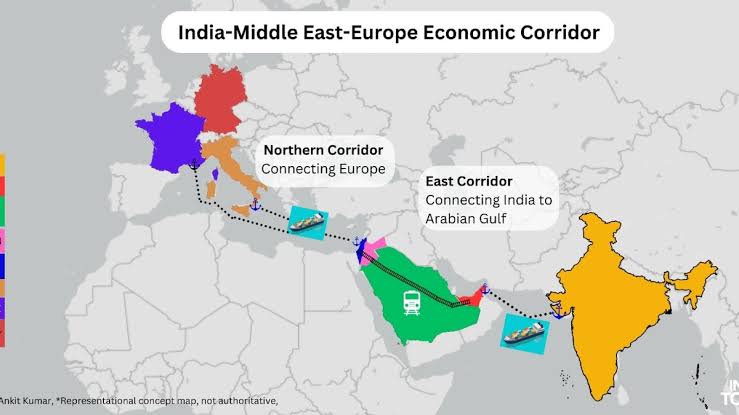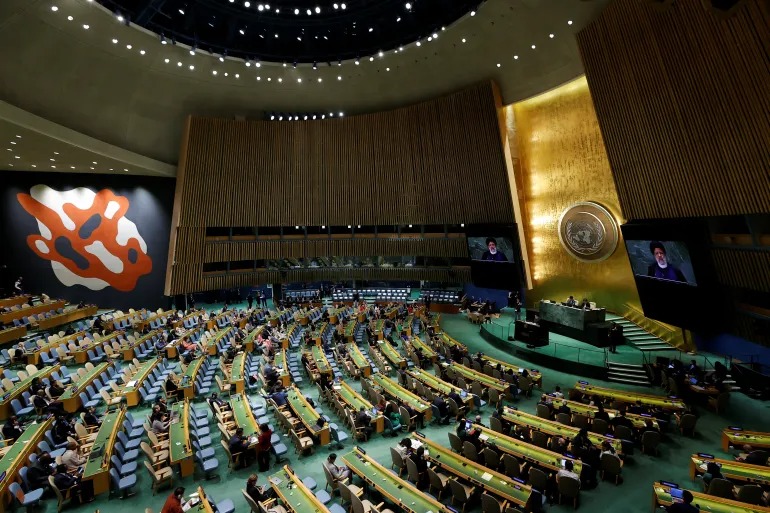A Challenge to China’s Belt and Road Initiative?
Is the India-Middle East-Europe Mega Economic Corridor (IMEC) the game-changer it’s being hailed as, or is it just another geopolitical move in an increasingly complex world? In a global landscape dominated by economic superpowers like the United States and China, IMEC is a project that has sparked intense interest and debate. The initiative, announced by Indian Prime Minister Narendra Modi and lauded by US President Joe Biden, promises to connect India, the UAE, Saudi Arabia, the European Union, France, Italy, Germany, and the United States through a massive infrastructure network. But what exactly is IMEC, and why is it being proposed?
US President Joe Biden called the launch of IMEC “a big deal,” predicting that the term “economic corridor” would become increasingly familiar in the coming decade. Prime Minister Narendra Modi, during the announcement of the project, stated that IMEC would be a vital tool for economic integration between India, West Asia, and Europe, providing a new direction for global connectivity and sustainable development.
IMEC is part of the Partnership for Global Infrastructure Investment (PGII), an initiative by G7 nations aimed at funding infrastructure projects in developing countries. It is viewed as a strategic counter to China’s Belt and Road Initiative (BRI), which has sought to extend China’s economic influence across the world.
Jon Finer, President Biden’s principal deputy national security adviser, articulated three key reasons for IMEC’s development. First, it aims to boost prosperity among the participating nations by facilitating the flow of energy and digital communications. Second, it addresses the infrastructure deficit in lower- and middle-income countries, which is essential for sustained growth. Lastly, it seeks to reduce turbulence and insecurity originating from the Middle East, potentially fostering regional stability.
In addition to these objectives, IMEC could be interpreted as a strategic move to bolster the G20 group’s influence, countering the dominance of China’s Xi Jinping and Russia’s Vladimir Putin.
IMEC comprises two corridors: the east corridor connecting India with Gulf countries and the northern corridor linking the Arabian Gulf with Europe. These corridors will encompass a ship-to-rail transit network, optimizing cost-effective transport routes for the involved nations. The project also includes plans for laying down a comprehensive network, encompassing electricity and digital connectivity cables, along with pipelines for clean hydrogen export.
EU President Ursula von der Leyen noted that IMEC would provide the most direct and efficient connection between these countries, reducing travel times by an estimated 40 percent. These developments mark a significant step towards the realization of the project’s ambitious goals.
IMEC is being seen as India’s response to China’s BRI, particularly in light of deteriorating relations between the two countries since the 2020 Galwan Valley clash. India has taken measures to attract global companies away from China, introducing incentive schemes to counteract China’s growing influence in the region. Critics argue that India needs to present an alternative vision to counter China’s dominant model effectively. Opposition leader, Rahul Gandhi called on India, Europe, and the United States to work together to establish an alternative and competitive production model for China at a press conference on Friday.
For India, IMEC could serve as a catalyst for boosting exports, especially at a time when its export figures have faced challenges. In the face of global headwinds, India’s exports fell by 16% to $32 billion. According to the newly reported quarterly GDP estimates, the share of exports in GDP fell to 20.9 percent from 24.4 percent in the same time last year. The project’s announcement aligns with the United States’ efforts to counter China’s economic influence, such as expanding the World Bank’s lending capacity for middle and low-income countries.
China’s BRI, also known as One Belt One Road (OBOR), was launched in 2013 with the goal of establishing an extensive network of railways, energy pipelines, and highways across Asia, Africa, Europe, and Latin America. According to China’s foreign ministry, the project has signed cooperation agreements with over 150 countries and 30 international organizations. While it has garnered significant international cooperation, some countries have reconsidered their involvement. Italy’s recent move to potentially withdraw from the BRI illustrates growing concerns about its impact.
The BRI has been a source of contention between India and China, particularly regarding the economic corridor’s planned route through Pakistan-occupied Kashmir. Recent reports suggest that China is contemplating a BRI 2.0, with more stringent scrutiny of new projects due to economic challenges and allegations of creating debt traps.
IMEC, as India’s direct link with key trading partners, aims to offset the BRI’s influence and promote economic growth and employment opportunities in participating nations. However, IMEC faces the formidable task of countering China’s vast network, which has already invested trillions of dollars.
The India-Middle East-Europe Mega Economic Corridor is a visionary project with the potential to reshape the global economic landscape. It aims to provide connectivity, promote prosperity, and foster stability in a region that has often been marred by conflict and geopolitical tensions.
As IMEC takes its first steps, the world watches with keen interest, assessing whether it can effectively challenge the dominance of China’s Belt and Road Initiative. While it offers promise and opportunity, the success of IMEC will depend on the commitment of participating nations, their ability to address challenges, and their capacity to navigate the complex geopolitics of the 21st century.
In an era where economic corridors are becoming synonymous with global influence, IMEC represents not only India’s ambitions but also the evolving dynamics of international relations. Only time will reveal whether this mega economic corridor will truly be a game-changer on the world stage.
















